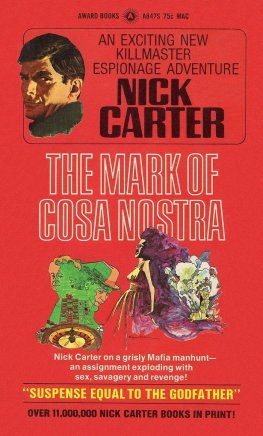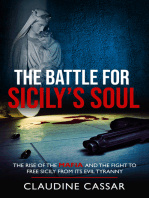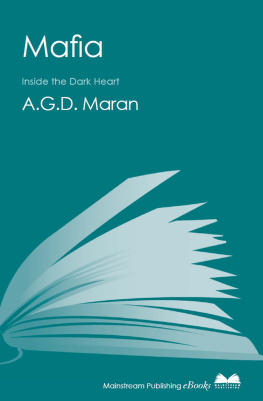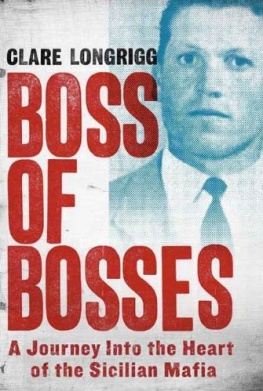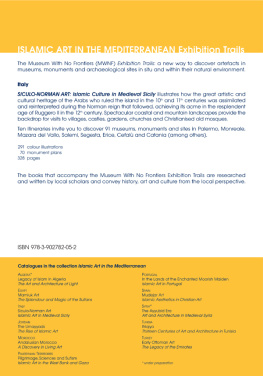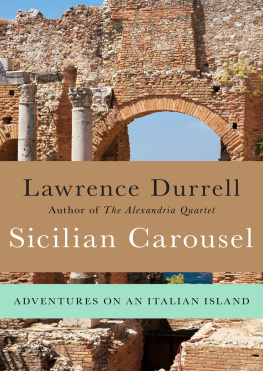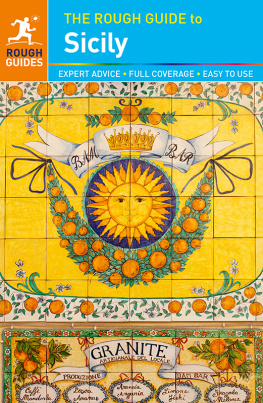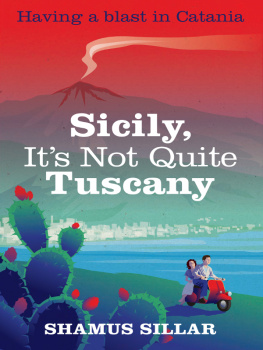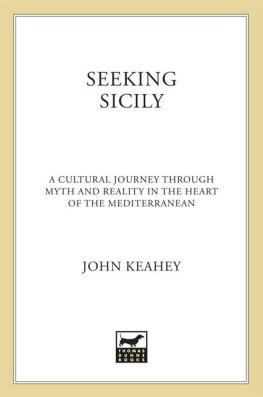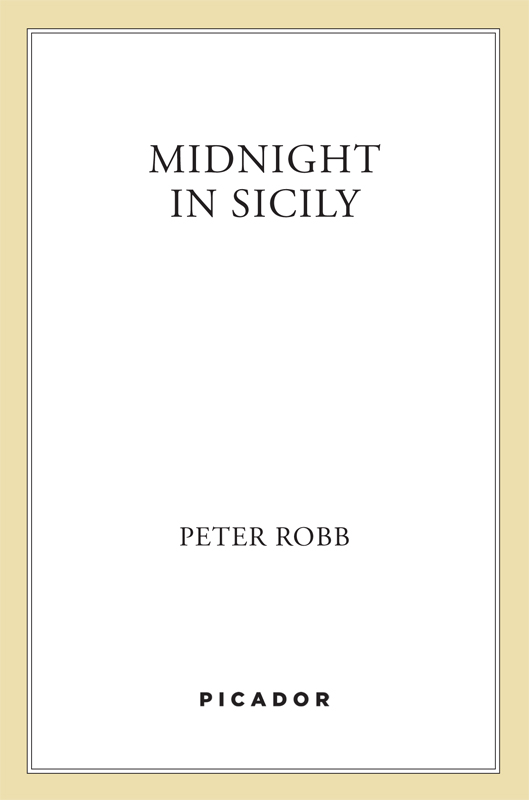
The author and publisher have provided this e-book to you for your personal use only. You may not make this e-book publicly available in any way. Copyright infringement is against the law. If you believe the copy of this e-book you are reading infringes on the authors copyright, please notify the publisher at: us.macmillanusa.com/piracy.
Contents
I.M.
WANDA JAMROZIK
MANY PEOPLE helped in large and small ways with my visit to Italy in 1995. Some are named in the account that follows, others not. Id particularly like to thank Letizia Battaglia, Angelo Benivegna, Pippo Bisso, Giorgio Bocca, Michael Burgoyne, Duncan Campbell, Gian Carlo Caselli, Maria Teresa Chialant, the staff of Corriere della Sera , Anna Maria Currao, Adrian Deamer, Claudio Fabio De Nardis, Michael Duffy, Enzuccia, the staff of LEspresso , Renata La Rovere, Dora Lo Cascio, Guido Lo Forte, Marco Lucchi, Pasquale Marchese, Vincenzo Marchese, Marta Marzotto, Mara Mele, Ady Mineo, Saverio Montalbano, Leoluca Orlando, Lina Panetta, Tullio Pironti, Gordon Poole, Anna Puglisi, the staff of Libreria Feltrinelli Napoli [Regina, Luigi, Paolo, Carlo, Nino, Claudio, Gennaro, Pina], Clara Salvo, the friends of the SantAndrea [Bartolo, Dario, Emiliano, Nabil, Stefania, Tot], Umberto Santino, Roberto Scarpinato, Shobha, Alex Snellgrove, Max Suich, Rosario Wrzburger. Since nobody was quite sure what I was up to, no one should feel implicated in the result and I hope no one will feel kindness has been compromised. Anyone whose name should figure above and doesnt I ask to forgive the omission.
PR
History isnt
the devastating bulldozer they say it is.
It leaves underpasses, crypts, holes
and hiding places. There are survivors.
Historys also benevolent: destroys
as much as it can: overdoing it, sure,
would be better, but historys short
of news, doesnt carry out all its vendettas.
History scrapes the bottom
like a drag net
with a few rips and more than one fish escapes.
Sometimes you meet the ectoplasm
of an escapee and he doesnt seem particularly happy.
He doesnt know hes outside, nobody told him.
The others, in the bag, think
theyre freer than him.
Eugenio Montale, Satura
When its night time in Italy
its Wednesday over here.
When its midnight in Sicily
The Everly Brothers, Night Time in Italy
INTRODUCTION
COLA PESCE was always playing in the sea and one day his mother said in exasperation she hoped hed turn into a fish. Which he practically did, and stayed under water for days at a time. Long distances he travelled in the belly of a big fish, cutting his way out with his knife when he reached his destination.
When the king wanted to know what the sea bed was like, Cola Pesce explored it and told the king there were gardens of coral, precious stones lying on the sand, and here and there heaps of treasure, weapons, peoples skeletons, wrecked ships. He went down into the caves under the castel dellOvo in Naples and brought up fistfuls of jewels. The king asked how the island of Sicily stayed above the water, and Cola Pesce reported that it was held up by three huge pillars, one of which was broken.
One day the king wanted to know how far down Cola Pesce could go in the sea, and told him to bring up a cannonball shot from the lighthouse at Messina. Cola Pesce said hed dive if the king insisted, though he thought hed never come up again. The king insisted, and Cola Pesce dived after the cannonball as it sank, fast enough and deep enough to grab it finally. When he looked up, though, the water above him was now hard and still and closed like marble. He found he was in an empty waterless space and unable to swim and there he stayed forever.
Cola Pesce or Nick Fish has a long history. In Naples they said he was figured on the carved relief of the part man part fish from a Greek or Roman temple that was dredged up from the harbour in the late middle ages. In Sicily his memory receded to Norman times, recorded in the eleventh century by people whod heard the story from people whod personally known Cola Pesce himself. Whether he came from Messina or Palermo or Naples, Cola Pesce belonged to that southern part of Italy, hot, dry, sea-girt, wracked by earth-quake and eruption, that Italians call the Mezzogiorno, that point in the Mediterranean where Europe is no longer entirely Europe but also Africa, Asia, America. The Mezzogiorno is the furthest part of Italy from Europe and the nearest to the rest of the world.
Cola Pesce had stayed in my mind for years and years, almost as long as Montales poem about historys interstices and escape routes, with which, in the image of entrapment under water, it ended up coinciding. Cola Pesce was in my mind now, as I came back to Italy, drawn by curiosity and fear, came back to Naples and boarded the night boat for Palermo, preparing to dive into the past, to explore things once half glimpsed and half imagined, desiring knowledge but afraid of entrapment down there in a dire and lifeless mental world of power. I wanted to know how deep the sea was, and what was holding up Sicily. Ready to dive and hoping to surface again, or at least find a rip in the net.
I
A MARKET
I WOKE with a start about an hour after midnight. The boat was still throbbing doggedly through the dark but I couldnt breathe. The roof of the cabin was a few inches above my face and there was no oxygen in the damp salty fug that was gathered there. The passengers on the other three bunks made no sound in the darkness. Maybe they were dead. I sweated, pressed and paralyzed, buried alive. Deep regular breathing brought no calm. I scrambled down without the ladder, putting a foot on an unseen face. The dim corridor was hardly better. The fug was thick with ships smell of engine oil and paint and stale brine. I found a companionway up to a deck where I waited till dawn among the lifeboats, still oppressed by the visible and palpable marine haze but breathing. All the oxygen seemed leached from the air on this fine and starless night.
Summer hadnt yet broken. The voyage south brought back other unbearable summer nights in the Mezzogiorno. The canopy of that heavy, airless dead stillness was over us like a fallen tent. In the morning, back in the cabin, I saw someone had screwed shut the cabins ventilation duct. Everybody seemed to have had a bad crossing. As we eased up to the dock in Palermo smartly dressed passengers were pressing like desperate refugees or immigrants at the place the gangplank would reach. I tried to imagine the place the arriving Greeks and Phoenicians called Panormus, all port , three thousand years ago. A wheelchair with a slavering lolling-headed idiot was shoved into this edgy ill-tempered crowd, ready to be first off. A cluster of nuns was poised for flight.
The yellow taxis lined up on the dock were all gone when I disembarked. After a coffee, several coffees, near the waterfront, I trudged up toward the centre of Palermo, past a showroom with half a dozen new red Ferraris on display. A little further on the carabinieri had set up a road block. There were carabinieri and soldiers, a lot of them, and fretful. The little hotel on via Maqueda, the hotel opposite the art nouveau kiosk, was abandoned. The windows on the first floor were shuttered or glassless, and the peeling wooden door on the street swung open on ruins. Retracing my steps, I found another place, in a third floor warren back toward the harbour, reached in a rattling metal cage. The room was above a coffee wholesalers, and full of the smell of roasting coffee. Down the road soldiers in camouflage were standing guard with legs wide apart at the entrance to a building of no evident interest. One of them caught my oblique glance as I passed and slipped the safety catch on his machine gun. Seven thousand troops had arrived in Sicily from the continent in the summer of 1992. Three years later the troops were still there. In a certain view, Operation Sicilian Vespers was yet another foreign occupation, and an oddly named one, since it recalled the bloody thirteenth-century uprising by the locals against the occupying Angevins from France, when thousands were massacred in days.


